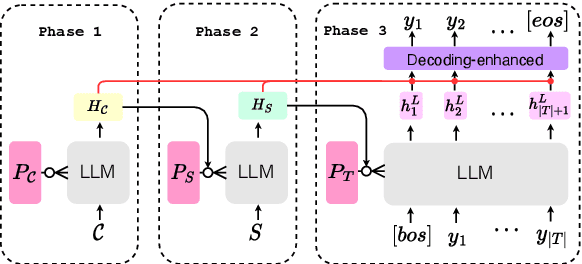DeMPT: Decoding-enhanced Multi-phase Prompt Tuning for Making LLMs Be Better Context-aware Translators
Paper and Code
Feb 23, 2024



Generally, the decoder-only large language models (LLMs) are adapted to context-aware neural machine translation (NMT) in a concatenating way, where LLMs take the concatenation of the source sentence (i.e., intra-sentence context) and the inter-sentence context as the input, and then to generate the target tokens sequentially. This adaptation strategy, i.e., concatenation mode, considers intra-sentence and inter-sentence contexts with the same priority, despite an apparent difference between the two kinds of contexts. In this paper, we propose an alternative adaptation approach, named Decoding-enhanced Multi-phase Prompt Tuning (DeMPT), to make LLMs discriminately model and utilize the inter- and intra-sentence context and more effectively adapt LLMs to context-aware NMT. First, DeMPT divides the context-aware NMT process into three separate phases. During each phase, different continuous prompts are introduced to make LLMs discriminately model various information. Second, DeMPT employs a heuristic way to further discriminately enhance the utilization of the source-side inter- and intra-sentence information at the final decoding phase. Experiments show that our approach significantly outperforms the concatenation method, and further improves the performance of LLMs in discourse modeling.
 Add to Chrome
Add to Chrome Add to Firefox
Add to Firefox Add to Edge
Add to Edge